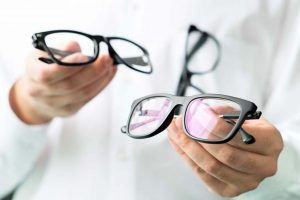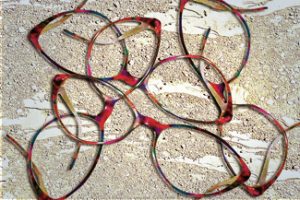Sunglasses are fashionable, but why are they so important?
Most people are aware of the harmful effects ultraviolet (UV) radiation can have on the skin. However, many are unaware that UV radiation can also endanger our ocular health and vision.
- Unprotected exposure to UV radiation can cause serious eye damage over time.
- According to the World Health Organization, approximately 80% of a person’s lifetime exposure to UV radiation is reached before age 18!
- Prolonged UV exposure can cause vision threatening ocular diseases, such as cataracts and macular degeneration.
Prolonged UV exposure can cause:
- Eye irritation in the eye
- Difficulty seeing
- Wrinkles around the eye
- Red or swollen eyes
- Sunburn on the eyelids
- Sunburn of the eye
- Cancer on or around the eye
Types of UV light
There are three different kinds of UV radiation: UVA, UVB and UVC.
UVA rays are not absorbed by the Earth’s atmosphere and therefore pose the greatest risk to our ocular health.
UVB rays are partially absorbed by the Earth’s atmosphere, and also pose a great threat to our ocular health. Overexposure to UVB rays can cause sunburns of the skin and eyes, as well as other ocular conditions.
Since our eyes are exposed to both UVA and UVB radiation, protection against these harmful rays is absolutely necessary.
UVC rays are completely absorbed by the Earth’s atmosphere and therefore do not pose any risk to our ocular health.
Why is UV exposure harmful?
Overexposure to UVB radiation over a short period of time such as a day at the beach, can cause photokeratitis, or a “sunburn of the eye”. This type of sunburn can cause temporary, but painful symptoms such as red eyes, light sensitivity, a feeling of something in the eye, and excessive tearing. Aside from the temporary pain and discomfort, photokeratitis generally does not cause any long term ocular damage.
However, an accumulation of UV exposure over the span of many years can cause severe ocular diseases such as cataracts or macular degeneration, and threaten partial or total loss of vision.
UVA and UVB radiation pose a great risk to ocular health because their radiation is actually absorbed by the eye—UVB rays are generally absorbed by the cornea and lens, causing damage to these tissues, while UVA rays penetrate deeper into the eye, causing retinal damage.
Is UV exposure only a threat on sunny days?
Although many people think that sunglasses are only needed when the weather is sunny, eye doctors say otherwise!
UV rays reflect off of many surfaces such as snow, water, sand, and even buildings! Snow actually reflects up to 94 percent of UVB rays, compared to water which reflects up to 8 percent. Reflected UV light is just as harmful as direct UV exposure— responsible for 50 percent of the UV radiation we are exposed to!
Many people are also unaware that sunglasses are necessary even when there is an overcast. According to research, on days when high clouds are present, the UV index is just as high as when the sky is clear!
However, it is safe to go out without sunglasses when the weather is rainy, foggy, or there is a presence of low clouds, as UV radiation is greatly reduced in those conditions.
UV exposure is at its highest between 2pm and 4pm— when 39.8 percent of Americans are outdoors. Be sure to wear sunglasses with UVA and UVB protection during these hours of the day!
If you suspect you have an eye condition, contact an eye doctor near you, who can diagnose and treat the condition.
SEE RELATED: What Are Transition Lenses?
The ultimate guide to shopping for sunglasses
Sunglasses protect our eyes from harmful UV radiation, blue light, and glare. Sunglasses are essential for walking outdoors, driving, sports activities, lounging at the beach, and more!
To ensure maximum protection, before purchasing a new pair of sunglasses, look for the following key elements:
- 100% UVA and UVB protection
- 75 to 90% visible light protection
- Distortion and imperfection free
If your job entails potentially eye-hazardous outdoor work, or you are involved in many sports, it is highly recommended to purchase sunglasses with polycarbonate or Trivex lenses. These lenses provide a higher level of protection due to their comfortable, light weight, and impact resistant qualities.
The color and tint density of the lens generally doesn’t impact the quality of protection. However, not all sunglasses filter 100 percent of UV radiation. If you are uncertain how much protection your sunglasses provide, ask your eye doctor— they may have special instruments that can measure the UV filter on your lenses.
Keep in mind that the larger the frame, the more protection you will receive. Larger lenses, or a tighter, wrap-around frame will offer protection for the delicate skin around your eyes as well.
If you are outdoors on a regular basis, wearing a wide-brimmed hat, specifically on sunny days, can further reduce UV exposure by up to 50 percent!
Sunglasses are available in a variety of shapes, styles, and colors— they are not only functional, but have been designed to enhance your style!
Already wear corrective lenses full time? No problem!
If you wear glasses full-time, you may be wondering what you can do, as an additional pair of sunglasses is just not an option!
Not to worry, there are a number of different options available to ensure that you also receive proper coverage.
Prescription sunglasses contain lenses that correct your vision, while providing the much needed protection.
Sunglasses with a larger frame can be worn over your prescription glasses.
Flip-up and clip-on sunglasses clip to the top of the frame for easy, quick coverage.
Photochromic sunglasses or polarized lenses automatically change from clear lenses to darkened lenses in the presence of sunlight.
LEARN MORE: Optical and Contact Lenses
Schedule an appointment with an eye doctor to discuss how to achieve the best vision possible.
Since UV light exposure can truly lead to harmful effects, set a good example for your children to encourage them to wear their sunglasses too!










